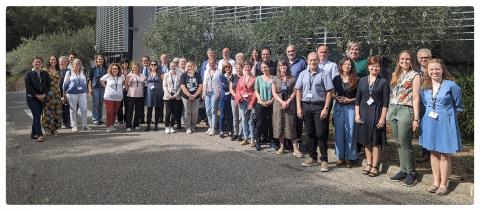THE 13TH EU RL ANNUAL WORKSHOP HELD ON OCTOBER 2023
The EU RL for Bee Health held its 13th annual workshop on 10th October 2023 in Sophia Antipolis (France) after three years remotely. All participants were particularly happy to meet in person. Informal discussions were intense and the EU RL leaders had to kindly interrupt long coffee breaks to resume the annual workshop.
The participants had the pleasure to listen to two presentations of NRLs’ activities and the current honey bee health status in Estonia by Merle Kuus (Representative of the Estonian NRL) and in Lithuania by Tatjana Ščavlinskaja (representative of the Lithuanian NRL).
Franco Mutinelli, head of the Italian NRL, presented a state of play of the occurrence and surveillance of SHB in Southern Italy. This year, Fayçal Meziani from the French Ministry of Agriculture presented the detection of small hive beetle in La Réunion island (France) in July 2022 and the action plan undertaken by the competent authorities. The French NRL presented the technical and scientific support provided to the competent authorities following the detection (Stéphanie FRANCO and Véronique DUQUESNE – respectively head and deputy head of the French NRL).
The EU RL also presented new information on the dissemination of Tropilaelaps over the world and focused on the feedbacks of the comparative laboratory test organised in 2022 and 2023 on Tropilaelaps mite identification by morphological methods. The workshop ended by the presentation of the EU RL activities during the last period and the work perspectives.
We warmly thank all the speakers for their interesting presentations and all the contributors for the fruitful discussions.
Documents and presentations of the workshop can be found here for the NRL network.

You must be logged in for downloading the report, click on the button below to proceed
Go to login pageDOCUMENTS AND PRESENTATIONS OF THE THIRTEENTH EU RL ANNUAL WORKSHOP
The annual workshop is the opportunity for the NRL network to exchange, to receive news from the partners and to have information on the activities run in 2023 and the future actions.
Agenda
The agenda can be downloaded here.
Presentations
1. Activities of the NRL and current honey bee health status in Estonia
2. Activities of the NRL and current honey bee health status in Lithuania
3. Update on the epidemiological situation linked to Aethina tumida in Italy
Detection of the small hive beetle in La Réunion island (France)
4. Epidemiological situation and competent authority action plan
5. NRL technical and scientific support
6. Information on Tropilaelaps dissemination over the world
7. Feedback on the CLT on Tropilaelaps mite identification by morphological methods
8. EURL activity highlights in 2023 and future actions for 2024
Minutes
The minutes of the 13th Annual Workshop of the EU RL can be found here.
Leaflet on Vespa velutina for beekeepers
The leaflets are available in different languages thanks to the collaboration of the EU and non EU NRLs.